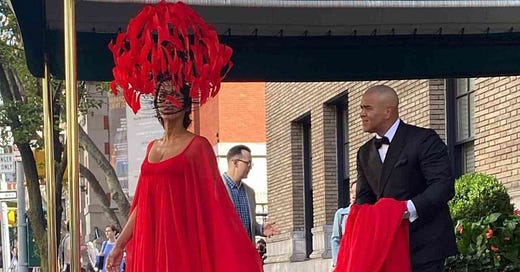More Than a Moment
“And Just Like That..." and "The Gilded Age" show similarities, differences in how they portray America’s Black Elite.

HBO’s “Sex and the City” was long criticized for its lack of diversity. Save for some famously awkward and cringeworthy interactions with Asian, Black and LGBTQIA+ guest stars, you got the feeling that the show’s main characters did not realize that they shared Manhattan with people outside of their little bubble.
That’s why when “And Just Like That …,” HBO’s continuation of the SATC saga as its main characters navigated New York as established middle-aged women, debuted it was important to expand their social circle. The show’s developers had obviously listened to the audience’s criticisms and decided to add “more color” to the group—even though it took until season two to promote them to main characters.
Nicole Ari Parker, as the fabulous Lisa Todd Wexley, has my full attention. When it comes to fashion and style, she certainly gives Carrie Bradshaw (Sarah Jessica Parker) some real competition.
Her glamorous dresses, jumpsuits and other attire are showstoppers (there’s always a dramatic train!), and that’s only part of her appeal. Her family’s storyline is what you’d expect of an elite Black family living on the Upper East Side: gorgeous children, a beautiful home and handsome hedgefunder husband (Christopher Jackson), who’s also well connected with political aspirations.
If you ask me, the Wexleys’ storyline is quite fascinating, and each week I find myself wanting to know more. More about their backstory. More about how Lisa got into producing documentaries. And more about how this dazzling Black family navigates New York’s cutthroat social scene.
In a sense, the Wexleys are as intriguing as the Scotts (Denée Benton [Peggy Scott], Audra McDonald [Dorothy Scott], John Douglas Thompson [Arthur Scott]) are on HBO’s “The Gilded Age.” For me, they light up the screen because it feels so good to see people who look like me look and live so well.
Different eras, of course, with families like the Scotts forging a path for families like the Wexleys more than a century later. As I wrote in a previous column, the Scotts were likely the first Black family to be invited as guests in a 5th Avenue home. Yes, they’re a fictional family, but we’ve never seen anything like this before on television.
Why is this so important, you ask?
The vast majority of movies and television series set during these eras tend to show Black families living in strife—struggling—instead of experiencing a soft life. In season one, I enjoyed watching Peggy report on the beginnings of the Red Cross and interviewing founder Clara Barton (Linda Emond). It was also nice to see the Scotts and other Black well-to-do families dress in formal gowns and tuxes at a rooftop party in season two to watch the unveiling of the new Brooklyn Bridge.
Save for the Scotts being invited into the Rhijn/Forte (Christine Baranski, Cynthia Nixon) mansion on the Upper East Side, their social interactions were exclusively with New York’s Black society. Meanwhile, the Wexleys’ were almost exclusively white. Interesting, huh?
Honestly, I completely understand why. I’ve spent a lifetime navigating through Black upper middle and high class societies, and it’s not always easy. There are some people like Lisa Wexley’s mother-in-law and Phylicia Rashad’s “Mrs. Elizabeth Kirkland” on “The Gilded Age” who are hell bent on making you feel like you don’t belong no matter what you’ve accomplished.
For example, Peggy was incredibly proud of her speech on fighting for Black women to vote in “Marriage is a Gamble,” the fourth episode in season three. Dr. William Kirkland (Jordan Donica), who is courting her and brought his family to support her new cause, gave her an enthusiastic standing ovation. Nevertheless, his snooty, condescending mom refused to acknowledge Peggy’s activism.
Instead, she downplayed the speech by basically calling it a “little speech” and Peggy “articulate.” It’s not that she dislikes Peggy. She’s just not impressed with her lineage because her father is a former enslaved man. And she mentioned that shit again on the sly.
I’ve learned over the years that with people like Mrs. Kirkland you either ignore the hell out of them or go toe-to-toe with them with the same gusto. During that scene, Peggy’s mother had had enough. She chose the latter.
I interpreted what she told Mrs. Kirkland: “Listen. What you’re not going to do is put down my family, especially my husband, who is a respected businessman in this community. Stop coming for us!”
I’m looking forward to more of this feisty Mrs. Scott!







I haven't watched The Gilded Age but have long been interested in upper-class black society throughout history, especially since Americans seem to think we've only ever been impoverished and on the lower rungs of the cultural hegemony. Would love to hear more about your experiences and thoughts as someone who has navigated "Black upper middle and high class societies."